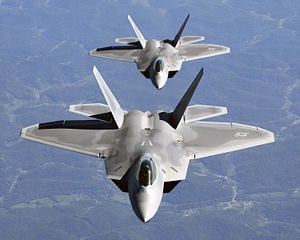Russia to Expand Syria Air Strikes against ISIS: Mission Creep or Strategy?

Russian Air Force jets have flown over 60 sorties since the onset of the Russian campaign against ISIL in Syria on Wednesday. The campaign has dislodged ISIL and al-Qaeda associated terrorist brigades. Kyrgyz President Almazbek Atambayev expressed his support for Russia. French President Francois Hollande accused Russia of having become a conflicting party due to its support of Syrian President Al-Assad. The Russian initiative is consistent with countering long-term NATO plans aimed at destabilizing the Russian Federation’s underbelly.
On Wednesday, September 30, 2015, Russia began launching air strikes against ISIL targets in Syria. As of Saturday, the Russian Defense Ministry reported that there had been flown over 60 sorties, bombing 50 facilities of the Islamic State. Col Gen Andrey Kartapolov of the General Staff told reporters on Saturday that:
The aircraft have been taking off from the Hmeimim air base, targeting the whole Syria. … In the past three days we have managed to disrupt the terrorists’ infrastructure and to substantially degrade their combat capabilities. … Intelligence reports say that militants are leaving the areas under their control. … There is panic and desertion among their ranks. … Nearly 600 mercenaries have abandoned their positions and are making attempts to get out to Europe.
 The President of fellow CSTO member Kyrgyzstan, Almazbek Atambayev, told the press on Sunday, that members of the Collective Security Treaty Organization (CSTO) should primarily think about protecting their own borders. President Almazbek Atambayev did, however, express his support for Moscow’s air strikes, stressing that the so-called Islamic State, a.k.a. ISIL, ISIS or Daesh had declared its ambition to control large territories. He added that:
The President of fellow CSTO member Kyrgyzstan, Almazbek Atambayev, told the press on Sunday, that members of the Collective Security Treaty Organization (CSTO) should primarily think about protecting their own borders. President Almazbek Atambayev did, however, express his support for Moscow’s air strikes, stressing that the so-called Islamic State, a.k.a. ISIL, ISIS or Daesh had declared its ambition to control large territories. He added that:
Fighting IS is in the interests of Kyrgyzstan, and in this aspect we support Russia’s air strikes on positions of terrorists in Syria. … I support the actions of Russia. … If a country does not have a legitimate government, it is falling apart. … Similar events were in Libya, and a similar situation is in Iraq now.
During a meeting of the so-called Normandy Four on Ukraine, French President Francois Hollande reportedly said to Russian President Vladimir Putin that:
France, in the name of the legitimate self-defense, considering Islamic State to be an immediate threat, since they are preparing terrorist attacks in France and Europe, also decided to carry out air strikes. However, I recalled during the meeting with Vladimir Putin that these strikes had to be directed against Islamic State, exclusively against Islamic State. … Proceeding from this, everyone should bear responsibility. … We must focus our efforts on this terrorist group operating in two countries — Syria and Iraq.
Hollande would later accuse Moscow of having become a party to the conflict in Syria due to what he described as Moscow’s support to Syrian President Bashar Al-Assad. The remark fell within the context of allegations that Russian jets had targeted positions of other than ISIL fighters.
Russian Foreign Minister Sergey Lavrov, for his part, would note that when someone behaves, moves and acts like a terrorist it is probably a terrorist. A diplomatic way of telling the press that Moscow does not see a great difference between ISIL and e.g. the Al-Qaeda associated Jabhat Al-Nusrah.
Iraq, Iran, Syria and Russia have established a joint intelligence center in the Iraqi capital Baghdad. Moscow has previously hinted that Russia was prepared to look positively at a request for help from the Iraqi government.
Alexander Mezyaev is the Head of the Chair of the Academy on International Law and Governance in Kazan, Tatarstan, Russia explained the Russian and international legal background for Russia’s military operations in an article entitled “Russian Operation in Syria: International Law”.
Coordinated International Effort against Middle East Terrorism counters long-term NATO Objectives.
In a January 2013 interview with nsnbc, retired Pakistani Major Agha H. Amin noted that one of NATO’s long-term objectives with the destabilization of Syria was to spread a string of low intensity conflicts from the Mediterranean along Russia’s and other CSTO members soft and resource-rich underbelly to Pakistan. It is within this context that the statement of the President of Kyrgyzstan, Almazbek Atambayev, and his country’s support for the Russian air strikes can be understood.
Expanding Russian air strikes to also include e.g. Jabhat al-Nusrah and other mercenary brigades operating in Syria and Iraq would not be mission creep but rather part of a long-term strategy to counter well-documented, predominantly US and UK forged plans to destabilize and eventually to “Balkanize” the Russian Federation by drawing Russia and other CSTO member States into protracted low-intensity conflicts.


